Issue Number 52, Spring 2021

Contents
- Dancing the Corona Do Si Do by Diane Ray
- It rains it thaws by Alicia Ostriker
- Everything alive by Alicia Ostriker
- River Returning by Robert Claps
- Shy Ponds by Dan Overgaard
- Untitled by Grace Marie Grafton
- Rumor’s a Fun Fact by Muriel Nelson
- Refugium by Marybeth Holleman
- Our Only Air by Kevin Swanwick
- Something about the Environment by Lois Marie Harrod
- 4.4 billion by Corbett Buchly
- unplug. eat away. turn out. by Corbett Buchly
- Morning on the Cliffs, Bolinas by Craig Segall
- Meow-Meow Studies Astronomy by Craig Segall
- Flood by Claire Taylor
- The Lilac Bush by Claire Taylor
- W/distance In It & Giraffes & The Canals Of Venice by Dennis Hinrichsen
- Self-Portrait W/coffee & Sand & A Nuclear Half-Life by Dennis Hinrichsen
- Disintegration by Alex Shapiro
- Metamorphosis by John Tessitore
- Osprey Missive by Lorraine Jeffrey
- Song for the African Scarabaeus zambesianus by Kelly R. Samuels
- The Calliope Hummingbird Speaks of Overlooked Flexibility by Kelly R. Samuels
- May Day 2020 by A.E. Hines
- To the White Egret I Saw Take Flight on the Eve of My Divorce by A.E. Hines
- Hoyt Arboretum Under Spring Rain by A.E. Hines
- Marine Layer by A.E. Hines
- Sunrise, San Luis Valley by Lois Levinson
- Bear and Wolf by Rhett Watts
- The Road Less Traveled by Walker Thomas
- Colossal Wreck by Robert Coats
- The Final Fairy by Anna Cates
- At Lake Martin by Diane Elayne Dees
- Call and Response by Jessica Gregg
Archives: by Issue | by Author Name
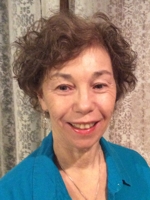
Dancing the Corona Do Si Do
by Diane Ray
Diane is a native New Yorker living amidst pine and birch on a hill overlooking Green Lake in Seattle, the 50,000-year-old glacial lake fed by rain, storm run-off, and the Ceder and Tolt River Watersheds.

My beloved pockets his portion of elevated risk,
of which I hold two scoops. Blithe moments require
a choir of all our cells singing from the balcony
of our lives: Que Sera Sera. Paul, my hour-long
early morning meditator, skates clean strokes between
compartments of his life. I clench my teeth to mentally
ensnare my grit, clamp shut my eyes, and beam away
my what if’s into far off clutches of a cosmic black hole,
depositing all my imagination’s capital, where, surely
not even my mental bungie cord has the tensile strength
to reel back in anxieties interred in surreal density, buying
me a sec of equanimity, enough, anyway, to spark my
enthusiasm for long walks in the real unreal of now-Seattle,
dancing our socially anti-social do si do with all comers
of our species who sometimes thank and sometimes preempt
us, veering to circle round, what with anyone a potential
Typhoid Mary. We toss our hello’s at least six feet, giving
one another the odd life saver of all-in-this-togetherness in
our separateness. How I envy the cotillions of cherry blossoms
congregating in their wishbone branches, the robin shopping
without a mask in my neighbor’s hedge, the snow-capped
Olympics shoulder to shoulder, sharing a cape of clouds.
© Diane Ray
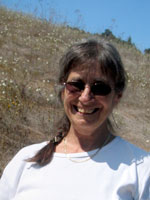
It rains it thaws
by Alicia Ostriker
Alicia lives in Manhattan Valley, formed by an east-west slash in the granite bedrock that goes downhill from Central Park west to the Hudson River. A stream once flowed down it; now wind from the river funnels up.

It rains it thaws the action is wild down there
the silvery cold delicious wetness
is seeping in
rootlets that taste it begin to grasp and shove
my god I feel it happening through my shoes
a thousand baby worms threaded from their cradles
already nudge the softening dirt
a thousand rootlets
open their lips
From the "Almanac" sequence in Alicia’s poetry collection, The Book of Seventy.
© Alicia Ostriker

Everything alive
by Alicia Ostriker
Alicia lives in Manhattan Valley, formed by an east-west slash in the granite bedrock that goes downhill from Central Park west to the Hudson River. A stream once flowed down it; now wind from the river funnels up.

Everything alive wants to surge and wilt
by its own rules, the tide in its veins, and in April
the green force is irresistible
but one great rule is life’s tenacious webbiness
another great rule is change
nothing stands alone, everything succeeds
and disappears
so the plants close their eyes in the rain
and robins drink their bliss
From the "Almanac" sequence in Alicia’s poetry collection, The Book of Seventy.
© Alicia Ostriker

River Returning
by Robert Claps
Robert lives in his native Connecticut, close to the mouth of the Connecticut River where it empties into Long Island Sound. Each spring he fishes for shad, whose numbers have been slowly increasing after centuries of devastation. During the Revolutionary war Connecticut river shad was salted and packed in barrels and sent downstream to sustain Washington's troops at Valley Forge.

Every evening now, a great blue gliding
down through the oaks just leafing out
stands motionless on these banks, where
growing up we threaded our way among
bald tires, dead carp, leaking barrels
of solvents the mills our fathers worked at
dumped when no one was looking.
Wasn't the river ours to burn?
Three shifts a day with all the overtime
you wanted turned the water green
but even Uniroyal couldn't kill it
and the river is growing young again:
spawning shad find the ancient ruined
channels and run upstream in numbers
no one living remembers. Yet the oysters
of Long Island Sound work overtime
to filter out the particles of this century's
plastic waste. How tenuous it all is.
Watch the infant oak leaves tremble
as you move quietly, hoping to get closer
before the wings creak open
and without moving the great blue is gone.
© Robert Claps
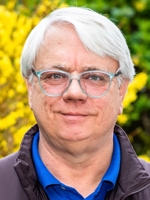
Shy Ponds
by Dan Overgaard
Dan lives on a hill above Puget Sound in an urban watershed supporting salmon migration from the Salish Sea to nearby Lake Washington, Cedar River and many smaller creeks.

Most ponds are shy, reclusive in the trees
and less athletic than the average lake,
less entertaining and gregarious,
much less flamboyant in their mode of dress,
less likely to be chosen for a sport,
less apt—like rivers—to be going out,
exploring, growing, never coming back.
They might enjoy the friendship of a creek
but not a rushing, energetic one
likely to overrun and wipe them out.
In winter months, a pond might disappear,
subsiding with a self-effacing sigh
into a tangled bed of leaves and reeds,
turning a lonely shoulder to the sky
and tucking in to wait the darkness out—
arising slowly from this dormancy
when hunger pulls it out to fill again.
In summer ponds are truly at their best,
quietly serving, on a busy day,
the endless postal circuits of the bees,
and setting up a local garden show
with modest prizes and a snack or two,
exhibits with aromatherapy,
and cool, medicinal displays of mud.
Late summer’s teasing breeze turns harsh in fall,
taunting the ponds as everyone goes home
in darkness, shivering. Muscling up,
the winds come from all sides, and like to snatch
away the modest dressing that the trees
have draped around the ponds. Yet once again
the gentle ponds persist by turning in—
their shy resilience wins, surprising us.
© Dan Overgaard
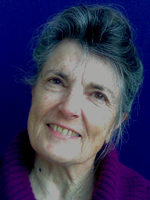
Untitled
the orchard will bloom, someone will play the guitar
Donald Justice
by Grace Marie Grafton
Grace lives in the wooded hills of Oakland, California, in the Sausal Creek watershed. Outside her kitchen door is a second growth redwood tree, part of a landscape that was blanketed with old-growth redwoods at the time of the California gold rush, and a short walk east from her house is the wilderness area of Redwood Regional Park, where she loves to hike.

Inaudible, the dirt in our gardens will breathe
a February breath, the small words
bless, heat, clarify will giggle through
wet-soaked particles that rub and churn
their joy against last September’s seeds.
A great sigh, an ink-free signing of the invisible
contract titled Cycle. Ribald celebrations
ripple through the stations of the loam.
Have faith. Earth does not depend on
human intervention nor instigation. We can
let ourselves off the hook, even when our
deaf infertile hearts fail to recognize
the music.
© Grace Marie Grafton
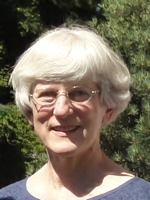
Rumor’s a Fun Fact
by Muriel Nelson
Muriel lives in Federal Way, Washington, near Puget Sound and West Hylebos Wetlands Park, one of Puget Sound’s last remaining peat bogs.

Roofs are steaming like beekeepers’ smokers,
or a roof is burning while bees smoke.
Plum petals fall so snowingly
that rain doesn’t show,
and my old foe photinia
votes again for the red party
blocking out windows with leaflets.
It’s peaceful, though, isn’t it?
The president’s people say everyone knows
whatever they claim today. Now
they say the president’s making good
(on one of his threats).
Others say a mustache is making war.
It’s shady business, so here come the pines
where there’s just enough room for a chair
between our old rhododendron
and new burning bush
if you’d care to sit
as crowds re-enact Exodus.
The air is as still as on 9/11,
the bees so calm you can host
a tasting in the bloom by your arm
or watch an ant rick-racking rough bark
while it climbs an inch or two as if, as if
(as if could take us anywhere),
as if bees weren’t endangered,
as if there were no drought coming
and no threat of smoke in the still air.
As if this too-early warmth with its plain blue sky,
green burning bush, and huge, gentle blossoms were normal,
were good.
Previously published in bosque journal.
© Muriel Nelson
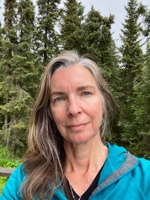
Refugium
after A.R. Ammons’ “Love Song”
by Marybeth Holleman
Born near the Cuyahoga River just before it caught fire, raised in the Great Smokies near the rolling waters of the Upper French Broad, Marybeth transplanted to Alaska’s Chugach Mountains after falling head over heels for Prince William Sound—just two years before the devastating Exxon Valdez oil spill changed her life trajectory.

At dusk, when the light
falls away from your slopes
and the line of your rippled ridge
sharpens against the golden
afterglow from the setting sun,
you with your halo don’t go,
watch over me as I lie upon
your soft treed arms and let
the cooling breeze of night
descend upon me, spent.
I climbed so long to get here,
to reach the ridgeline of your lips,
to fall to my knees in wonder
at all that lies at your feet, vast
in all directions. More than I can
hold in my arms, say with my
tongue, more, I want to stay
on your sturdy shoulders and wait
out the storm sure to come, the one
we have set upon ourselves with
our desire to have, to have, to have.
Let me remain here with you, large
and immoveable rock, mountain,
let you be my whole world.
© Marybeth Holleman

Our Only Air
by Kevin Swanwick
Kevin lives within the Lower Hudson River watershed between the Hudson and the Shawangunk Kill, a few miles from 600-acre Shawangunk Grasslands wildlife refuge, which he visits every week to monitor the visitations of Northern Harrier Hawks and Short-eared Owls (November to March) and a wide variety of birds during the rest of the year.

We are sharing the air here & there
you on the craggy arm of a tall black locust &
me on the morning ground.
When I think of travel I think of crafted roads.
But then you soar
feathery arms dihedral with rufous tail trailing
catching swells of sky on delicate spirals of spring breath
moving up & then downward falling forward
led by a silent stare that peers through the brisk gales
that act out this morning’s airy high.
Swooping incognito you invent the look of a spy undetected
as we share our secret alone.
I inhale this air & return it in short order parsed with
metered breaths that push each other aside
rising & falling over a grid that my feet can slip through.
When I try to read the motioned map of jubilant gusts you commandeer
dividing bursts & swirls that give no sign of pause
you offer your back in full extent to my grubby eyes before that
feinted flight vanishes with a turning halt & you bare
a tawny breast with rusted tail lowered like a stylus making ligature behind
your curved sharp beak plunging to the rye-grass field
where gravity as guilty bystander watches the dive ending in a death stroke.
The meadow vole is showered in shade by the final flush
of your wings, its last measure of sun seen before the four-talon strike
empties life into the air—our air—enclosed in your dangled cage.
If I were Icarus, I’d follow you to that raised station overlooking our air & its
subject ground. I’d seek answers to my questions of flight & those
of observed earth keenly watched at far range—the ones that travel the world
on behalf of voles & persons in search of the truth about whether or
not we’d take every last one & leave a barren field below our only air.
© Kevin Swanwick

Something about the Environment
by Lois Marie Harrod
Lois lives in the Stony Brook watershed in Hopewell, New Jersey, a sweet little town that has been here since the l8th century. Though close geographically, it seems far from the turnpike-oil-refinery New Jersey.

Tonight I’m watching a video
several of my high school freshmen
posted on You-Tube.
They are rollicking a rowboat
on a shallow suburban lake.
And the boys—a flop-haired Ulysses
and his swabbies—are filming themselves
with difficulty, their shirtless torsos
and basketball shorts bobbing about
their beer-brine sea. They are filming,
their version of that sack of winds
the King of Breeze gave to our hero,
and in their version it looks like a plastic
shopping sack from Target.
As soon as our teenage hero closes his eyes,
a smirking friend opens the wind bag
and the camera begins to bob
the way it might in a seasick horror film.
I know they are hoping for an A—
and they’re having such a good time
how can I refuse?—though it looks
like their rowboat is about to capsize.
They have not asked how Aeolus
crammed those winds into a burlap purse
or whether they have any chance now
to return the bora, brickfielder and southerly buster
to their tote or stuff the sirocco, the shamoon,
the zonda back in their bottle,
or suck the typhoon and samoon
back to their lamp. And how can I condemn
their shenanigans--when I know
we all should have listened to Odysseus
50 years ago when we had the chance
to herd the hurricanes back into the bag.
First published in The Blue Nib 1/15/20
https://thebluenib.com/something-about-the-environment-featured-poet/
© Lois Marie Harrod
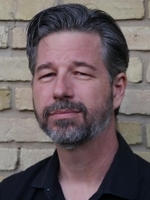
4.4 billion
by Corbett Buchly
Corbett abides at the headwaters of the Trinity River on the Blackland Prairie, a nearly flat landscape in all directions. Daily he grounds himself, bare soles against the dark, fertile clay soil.

before life mindless disorder reigned
slowly coalescing then bursting
apart again, in the void of voice
no song, no grunt, only the hiss
and sigh of the universe settling,
both stupid and stupefying
micro-organisms did not blink into being
as if suddenly ignited
no spear of lightning, no divine touch
but from a sky devoid of air
and a carbon-heavy sea
lingering in the hot fluids
of thermal vents, chemicals arranged
dull and chaotic, they came together
drifted apart, over and again
as complexity ambled forward
fats, sugars and acids circled each other
a feint, a jab, a hold, a grab
a spontaneous epoch-long jazz hustle
the steps grew intricate
as dancers learned their partners
hypnotized by the sway of hot current
the dancers discovered a desire
to dance until time itself retires
hardly a flash of progress
in a hundred lifetimes
a billion failures strung out
like splotches of blackest ink on star-blue page
but bit by agonizing bit, this primordial glue got
around to the business of self-replication
as if all matter and idea find their path toward increase
no Hollywood plot or holy providence
this existence is miracle enough
no intelligence was witness
to sound the trumpet or beat the drums
to record the conditions or write the recipe
no one took a Polaroid
no one can start a secret
when no one is there to begin
© Corbett Buchly

unplug. eat away. turn out.
by Corbett Buchly
Corbett abides at the headwaters of the Trinity River on the Blackland Prairie, a nearly flat landscape in all directions. Daily he grounds himself, bare soles against the dark, fertile clay soil.

unplug all the phones
rip the wires from the walls
dislodge the wheel from the crankshaft
and melt the tire iron in a torrent of fire
dash the television with the microwave
be done with them both
get the chainsaw stuck
let the teeth sink to rust
give back the gas to those fossil fields
grind your mobile in the disposal
return to machine language
before there were machines
think in ones and zeroes by kissing
your loved ones – or not
topple the towers – radio, radar, microwave
now the realm for nature and cosmic whispering
open your veins over the ink wells of the automatic press
go to press with sheets of solid red
gum up the works
until media conglomerates crumble
eaten away by dull speech
put hearing aids to the heel of your boot
let pacemakers run their course
eat your batteries
and shit acid undiluted
like puritanical alchemists
wire the MRI to the CAT scan
let them overload with morbid minutiae
go back to healing with intuition
it worked for the Sumerians
unwind all the film
and burn it with the Hubble lens
stand in awe at the new colors invented and destroyed
take pot shots at satellites with aging rockets
like the world’s biggest penny arcade
turn off the damn life support
raise your own food
from the dry dirt
don’t bathe
sleep under the stars
shiver
uncontrollably
turn out the goddamn lights
© Corbett Buchly

Morning on the Cliffs, Bolinas
by Craig Segall
The Lower American River flows past, still wild, not far from Craig's home and garden. He spends his days trying to protect air quality while his wife Lilly restores salmon runs on the river; they both hope it runs clear and cool past the cottonwoods for years to come.

Earthship, barely moored:
Past Olema, the chalk downs roll
their long cove-broken arc to the far point.
Spring rain sweeps in, clouds like sails
above the prow of the bluff where we wait,
Perched. This land follows the whales north.
Roots -- apple, oak, rock -- arc and strain;
erratic place riven down to its fern canyons,
wind sweeps past the mounded iris blooming.
No turning from the long dissolving journey, the salt dark.
Still: We have come from a warm farm kitchen where we woke
to rain on the window and the frogs trilling. Three dogs pile
on warm tile floors. Today, you are in your body and I am in my body.
The curve of the mug fits so well into the curve of my hand.
A sudden sweetness fills me, waking, walking these long low billows of land,
itself infirm, on the cliff edge crumbling to breaker, breaker, breaker.
© Craig Segall

Meow-Meow Studies Astronomy
by Craig Segall
The Lower American River flows past, still wild, not far from Craig's home and garden. He spends his days trying to protect air quality while his wife Lilly restores salmon runs on the river; they both hope it runs clear and cool past the cottonwoods for years to come.

We are listening to Beethoven,
late morning fading to early afternoon,
on a sunlit Sunday at the start of spring.
The cat curls softly in her warm ray.
Eight minutes ago,
the vast plasma furnace of the sun,
all whorls and arcs of flame,
sent the roaring wind over a hundred million miles,
passed the swinging curves of the inner planets,
past the near-molten crags of Mercury, the acid
bath of Venus’s nightmare furnace,
to find her tufted ears.
She turns, a lesser satellite,
content in her orbit,
and presents
a warm belly to my hand.
© Craig Segall

Flood
by Claire Taylor
Claire lives nestled between the Jones Falls River and Stony Run stream in Stone Hill, one of Baltimore's original mill villages located in the Jones Falls watershed.
A thistle grows where my bedroom used to be. Imagine me as a child,
spindly purple flower sprouting through my chest as I sleep. The living room
is gone. So too the spiral staircase painted red, purple, yellow, teal. The sun room
where I found the brown recluse. The deck with a plastic roof that sounded like a
snare drum whenever it rained. How deafening it must have been that day
when the rain never stopped and the river tore through the earth, reckless,
ignoring the turns and curves of its banks, lifting the neighbors’ house from its
foundation, sending it crashing into ours. Nothing remains but
the river, calm now, awaiting the next storm. The river and the Buddha.
Two feet of thick stone purchased from a garden store up the highway.
Eternally smiling, immovable as the seasons ebb and flow,
the world rages and fades. Someday all the shores will be
lost to rising water, rivers and oceans unbound.
Where will we go when nothing remains of
the place we called home?

© Claire Taylor

The Lilac Bush
by Claire Taylor
Claire lives nestled between the Jones Falls River and Stony Run stream in Stone Hill, one of Baltimore's original mill villages located in the Jones Falls watershed.

We ripped out the lilac bush. It sat next to the shed that held the
water heater, the ancient boiler, the circuit breaker that popped
whenever we used that one outlet in the living room. We
demolished the shed to expand the house, and the
lilac bush went with it. The lilac bush that would be in
bloom right now if it were still here, but it isn’t. The lilac bush the
dog would be sleeping beneath, flowers branching out
above his head like purple sun rays beaming from an
auburn core, but the dog is gone now too. Gone even before
the lilac, though I still picture him daily, an apparition
moving through the house, including the new rooms
spaces he never inhabited
In winter, when the lilac would have been
barren, spindly, the new walls went up. The spot
where it once stood now looks like a place where
a lilac had never been, would
never grow. I told my husband I’d feel a bit
sad come spring, our first without
the lilac. I didn’t know by
spring the whole world would
be different, the lilac bush the least of
the things we have lost.
Previously published in POEMS FROM THE LOCKDOWN (Willowdown Books, 2020)
© Claire Taylor
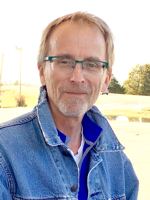
W/distance In It & Giraffes & The Canals Of Venice
Jacksonville Zoo //ATL // COVID-19
by Dennis Hinrichsen
Dennis lives a short walk away from the convergence of two rivers in the Great Lakes Basin that flow west to Lake Michigan.
—I breathe indiscriminately // I kill
the same // the distance I maintain meaningless because at some point
I will have to lean down & take the soft puck of wet meat & press it
to wildness—palm flat to the bars so only fang & tongue
can graze skin // animal gulping down this generosity—this care—
then lunging // eyes clear // to the throat
—O coronavirus you are so jaguar with your spiked-exterior wish
to claw & bind me // still I risked giraffe tongue for you—
it was long & blue & wrapped my wrist as if my hand were leaf &
not the killing agent it sometimes is & then the full head dropped
so I could rub its lips—a whiskery-muscular pleasure // doubly
perceived (I hoped) // & then another stilted over
& then a third—a calf—& all were tranquil (maybe) // & then
it was done // I was gone // car rental back through ATL //
that other wet market of exotica—muffled coughs // moisture //
each thing I touched // & on the plane // this porous
habitat of breath & skin // —O fish in the canals of Venice
I can see you now the water is so clear

© Dennis Hinrichsen

Self-Portrait W/coffee & Sand & A Nuclear Half-Life
Saugatuck // D.C. Cook Nuclear Power Plant
by Dennis Hinrichsen
Dennis lives a short walk away from the convergence of two rivers in the Great Lakes Basin that flow west to Lake Michigan.

—sometimes I’m just a pinch of sand lifted
by plutonium then made molten // a melted green
raining down to the desert floor in quartz grains & feldspar //
marvelously complex—yes—Alamogordo gold //
& sometimes I am just sipping coffee
in a Saugatuck café north of two reactors // one mile
outside the ingestion pathway zone // I have gathered here
w/others to work the grid—the wi-fi’s free—& escape
the overages—breath & throat & blood & lung //
—but still I ingest // work a duality—the caffeine half-life
I need to power home from a day at the beach versus
radioactive churning at Stevensville // all those live rods
feeding the Rocket Apartmento espresso machine
so I can get my fix // —O Yucca Mountain I am going
home now into the twilight // like you // unblemished //
speeding // singing & speeding // Bluetooth on—radio
loud—windows wide open
© Dennis Hinrichsen

Disintegration
For Andy Goldsworthy
by Alex Shapiro
Alex grew up in the Hudson/Wappinger watershed, moved to the Charles River watershed, and currently resides in the Lake Michigan watershed, continually confounded at the sight of such a large body of water with no salt in the air.

When time instructs the tide
to swell, and foam blurs
the border between earth
and ocean, the stones are gifted
agency: either bond to the land
tighten and endure, or they let go
of all they have known and search
for a place to embrace
their imperfections.
© Alex Shapiro

Metamorphosis
by John Tessitore
John lives in the SuAsCo Watershed, feeding the Sudbury, Assabet, and Concord Rivers. There are a few hopeful signs that this cradle of American literature, and of revolution, is finding its voice again, in the howls of returning coyotes and the nocturnal scream of the fisher cat.

The rattlebone branches of the maples
are tapping their skeletal rhythm, as the lilac
sighs its burgeon magenta, as the peaking
azalea hums like an engine, as the cardinal
sings with a cantor’s precision.
I rake the mulch of winter to a midden,
a buried mosaic of broken shells,
intentions hidden in soil, in time forgotten,
yet someone here once paid attention
to structure, to the marrow if not the nacre.
So here I will till with my grub hoe and trowel,
split the tamped surface and sift the compost
from my kitchen. Every peel, core, eggshell
adds a grain of texture, tilth to support
snow peas and peppers, heirloom tomatoes.
In this spring of severed connections
we will have leafy greens, yellow blooms, bees,
rangy vines that reach for the sunrise
and roots that burrow down through tiny shards
of oyster stolen from the sea, scraped
from the bottom of a bay. And nothing
will be wasted anymore, not the worm
in its labyrinth, not the pill bugs that molder,
not the spider’s web, and not the vineyard
that ripens by the woodshed—grape hyacinth.
© John Tessitore

Osprey Missive
by Lorraine Jeffrey
Lorraine is a high desert resident of the Great Basin watershed and enjoys snow-capped mountains within walking distance. But her salt-water soul has guided her back many times to her childhood home near the Oregon Coast. She is fascinated by the contrasts of topography, wildlife, plants and the management of water within the two disparate areas.

He fell like God’s hammer,
possibly dropped
in renovating heaven,
and slapped the water
with a sound that snapped
all heads to the lake.
A shiny black gargoyle, of parts
and angles, as if he were built
from an Erector set,
wrestled like a vengeful angel
in swirling water, for dominance.
Then, his great ebony wings
pushed the air down
in one powerful stroke—
he rose high above us,
the silver fish flashing
an unknown distress call
from his comma beak,
serpentine as an interrogative,
hoping to escape
ending a sentence.
First published in Waterways.
© Lorraine Jeffrey
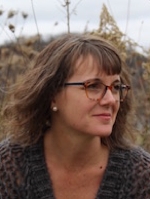
Song for the African Scarabaeus zambesianus
by Kelly R. Samuels
Kelly lives where the La Crosse River, the Black River, and the Mississippi meet and meld.

Not by bright sun, that near
perfect star blazing.
Not the shadows it casts
sometimes or always, or the moss
on the northern side guiding
without compass, that spinning
needle. Rather, moonlight.
You—the first known to look
only to a mass of stars
and other revolutions
for steerage. Landing
to do the important work
of the field of home
and far—the moon
and all its companions clear
in either sky. See the shine
of the gem worn as brooch,
as clasp, as amulet. Sacred thing
transplanted.
© Kelly R. Samuels

The Calliope Hummingbird Speaks of Overlooked Flexibility
by Kelly R. Samuels
Kelly lives where the La Crosse River, the Black River, and the Mississippi meet and meld.

Migration asked too much of me.
I was not a little star with my light traveling
all those thousands of miles, but rather like
a woman at her desk altering with pen the landscape
of her life. So be it. If I could not build the nest
and lay the egg when I did, then a change of.
A shift to, so as not to tire, not to wear myself out
and come to an ending I did not desire just yet.
It took you so long to notice, busy as you were
with other things. And I was so tiny, just a slip
Flit of wing you thought you saw out of
the side of your eye earlier than usual – just
a week or so, spring coming sooner. Farther
east and north, they talk of my larger and far
distant relative seen departing later and later
every fall, and of how little snow there is
even into mid-January. But, me – I was over-
looked until now with all my quiet adaptation
experts assert is necessary for everyone
and everything. We must do
what we must do.
© Kelly R. Samuels
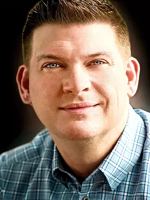
May Day 2020
by A.E. Hines
AE lives in Oregon at the confluence of the Columbia and Willamette rivers in the shadow of the volcanoes of the Cascade Range.

In hindsight we should
have seen it coming —
our non-stop fuck-wittery,
our ignoring the signs
and her myriad calls
of distress.
Is it any wonder?
Mother Nature saying:
“Go to your rooms!
Like all of you — like now!”
Tell me, what else
could she have done?
Look at the clear skies.
Look at the wild animals
walking our city streets.
At us, back where we started
hiding in caves.
Be still. Be quiet. Mother
is catching her breath.
© A.E. Hines

To the White Egret I Saw Take Flight on the Eve of My Divorce
by A.E. Hines
AE lives in Oregon at the confluence of the Columbia and Willamette rivers in the shadow of the volcanoes of the Cascade Range.

Everything is connected.
And nothing lasts.
That’s what I am thinking
when you stretch
the S-curve of your neck
and claim the air,
lift breast,
lift wings,
your black talons rising
above blackberry brambles
towing nothing
but wind.
© A.E. Hines

Hoyt Arboretum Under Spring Rain
by A.E. Hines
AE lives in Oregon at the confluence of the Columbia and Willamette rivers in the shadow of the volcanoes of the Cascade Range.

The tiny woodpecker
in his little red cap
and black feather cape
might as well be a bishop
shifting through the cedar colonnade.
Head turning left and right,
he hops trunk to trunk,
ringing the bell of every tree.
Here in this city forest,
I am the young boy
at high church, sitting dead center
of the cross-shaped nave,
staring up, dumbstruck
by the misty limbed vaults,
the dripping pine cones
like beatified faces
of saints looking down
from stained glass.
Last summer, every day, rabbits
crossed our path, red-tailed hawks
circled the sky. We thought
we might all be saved. Then
came fall. And winter. Now
life returns but we sit at a distance,
turn our heads, cover our faces,
cough into our sleeves.
What to make of this moment
beneath the arc of living things
when the sun, at last, breaks
the eastern gate of this wide ravine,
the rustle of needles singing
in the breeze, the trickling creek,
the insistent swaying
of pine branches and leaves,
what else but to think of a church
packed full for Easter, packed full
with pine boxes, with bishops and bells,
with the wails of mourners
raining down.
Finalist for Atlanta Review International Poetry Competition, Fall/Winter Issue 2020.
© A.E. Hines

Marine Layer
by A.E. Hines
AE lives in Oregon at the confluence of the Columbia and Willamette rivers in the shadow of the volcanoes of the Cascade Range.

When my time comes to dissolve,
to let go of form, let me be water and air
so I might slide freely across the rough surfaces
of the earth, not stuck in rock, or dirt
or hewn stone.
Let me be mist—rolling across mountaintops
in the bright morning light,
crawling the valleys and crevices,
kissing all that cross my path—
precious or reviled.
Let me circle the earth, a marine layer,
to make the moss and ferns grow,
and wrap my diaphanous arms
around the alder trees,
cloaks of gray-green lichen
climbing up their trunks.
Let me push patiently out to sea,
and spread myself low and thin above the waters.
Let me stare down at my own reflection
and wait for the sun to rise and rise
and lull me into the nothingness
that is everything that was.
First Published in California Quarterly, Volume 43, No. 1, 2017. Nominated for Pushcart Prize.
© A.E. Hines
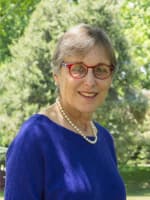
Sunrise, San Luis Valley
by Lois Levinson
Lois lives at 5,600 feet at the western edge of the Great Plains and in view of the front range of the Rocky Mountains. She loves to wander in riparian and montane habitats in search of birds.

Sandhill cranes rise
in flocks from the waters
of their nighttime roosts,
trilling urgent conversations
as they pass overhead
in skeins that etch
a fine script across
the fresh page of dawn sky.
The sun emerges from its early
morning climb up Blanca Peak,
as the paling full moon slips
behind the San Juan Range.
Between sun and moon,
only the wingbeats of cranes.
© Lois Levinson
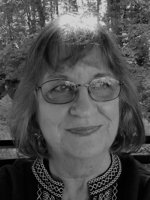
Bear and Wolf
For many, the bear and wolf are the last true
symbols of the primal natural world.
National Geographic
by Rhett Watts
Rhett lives in the Blackstone River watershed yards from a brook that runs off the Lower Worcester Plateau. Her neighborhood is inhabited by American mink, foxes, bald eagles, humans and is not far from the Last Green Valley heritage corridor.

He shakes off den dreams, splashes
loping over brook stones--a bear on a ramble.
Dazzling, scent stronger than wet wool,
his yelps echo like sliding rock.
Then up against a snag, purple tongue
reaches for honeycomb as a wolf wig wags
at his feet. Back-scratching, the bear
seems not to notice. She-wolf bows, dodging
before the standing bear who drops on all fours.
A single wolf is small threat. This night
and for nine nights more they roam together,
companions in the moonlit basin until dawn.
Even share prey throughout their long truce.
Parted, wolf enters the shallows.
Her pelt, the sky, silver as the trout writhing
in her jaws. Bear probes for ants in the
cracked cliff face. On a far canyon's wall,
the pair's likeness is erosion-etched.
The strange bedfellows--bear forever bent to
wolf's ear. Between them, a vein of mica
lustrous as the setting sun.
© Rhett Watts

The Road Less Traveled
by Walker Thomas
Walker lives in a small suburban cave near the Rillito River on its, usually dry, course to the Santa Cruz.

In 1979, few beside Al Gore, his old Harvard professor and those in their academic circle knew about global warming. To the rest of us, pollution meant smelly ponds and big-city smog, watery eyes and burning airways, the browning of buildings and of trees at higher elevations. Those seemed problems enough.
On a balmy, late-fall Friday night, I took a break from the books to drive under a gentle rain and across the Tucson Mountains to Avra Valley. Traffic was scarce when I’d last drove that stretch fourteen years before. Outdoor enthusiasts perched atop oversized wheels roared by me one after another on the unpaved mountain pass. They left a tiger rattlesnake in their wake.
Its head listed at an angle.
I maneuvered the thick-bodied, small-headed, dusty gray rattler with faded cross-bands of tiger-orange into a pillowcase and returned home.
In a terrarium, the little rattler yawned to reposition bone and cartilage in its flexible skull. Jaws agape, it erected its fangs. One was broken, but a series of new ones stood in a graduated row behind, the next largest ready to take the missing one’s place. It looked full-bellied enough to survive a rapidly approaching time of winter hibernation while it healed.
I released it in the rocks above the road the next morning and drove down into Avra Valley.
The packed-sand was still wet under an overcast sky. A dead roadrunner, long, dark-green feathers rustling on a breeze, was an exotic-looking heap. A battered, beadwork purse in pink and black had been a Gila monster. Broken under a resilient cover of fur, a dead coyote lay like any dog asleep beside the road.
I found a still-living sidewinder, also called horned rattlesnake for its hornlike awning over each eye. Windblown sands in Avra Valley mark the easternmost extent of its range. Its unique method of advance over loose sand like a rolling corkscrew confines the small, salmon-pink and paint-spatter-white rattler to areas of shifting, fine-grained sand west of Tucson. This one was tire-pressed into the somewhat forgiving surface, stunned and sluggish.
I carried it to the shade of a distant ironwood tree, where it might heal if undisturbed, and then drove home by the paved southern route through Gate’s Pass.
An uncommon brown shroud covered the desert ahead as I descended from the pass. A ghostly Tucson peeked from under the smudge of smoke from far-off smelters and an increasing haze risen from the cars of the many who, like me, took to the roads to enjoy the day.
I’d answered an ambulance call to an attempted suicide three years earlier. Passersby called 9-1-1 about a man down before an idling car parked half-in, half-out of a garage. Instead of closing himself in with the fumes, he backed the car up just enough so its tailpipes emptied outside. Then he sprawled in front to await an unlikely death.
In his madness was a metaphor for the slow suicide of us all. The fumes he avoided in staging his personal drama emptied into what we once considered an infinite atmosphere. But we altered its color and clarity, tinted the firmament with our waste until it proved as finite as the space within a garage.
An alien visitor to our planet’s larger cities might think our skies were formed of a dingy, pungent medium that obscured distant objects and burned the throat. That we could visibly alter the chemistry of a planet’s atmosphere in a few generations showed the scope of our industry, but little of our humanity.
Our visible effects —the brown haze and acid rain, the irritation to throats and lungs by inhaled particulates, the strength-sapping burn of ground-level ozone— proved the smaller problem. We learned that more critical is how the imbalance of the less-visible carbon dioxide in atmosphere traps and intensifies surface heat. The effects compound the way the chemical changes in an injured person’s body snowball into a life-or-death crisis. Our weather, our fresh water reserves, the planet and all its life are at risk. Predictions fall short when that snowballing of cause-and-effect kicks in. We did this in an innocent desire for an easier life. Innocent or not, we’re small fish to so foul our pond.
We dickered over the magnitude of the problem, saw our individual contributions as negligible while we continued the assault, each doing his or her small part. I demanded that government put a stop to planetary abuse while I continued to contribute to the problem.
We move on roads carved into mountains, on swaths cut through forests, gravel beds dumped on marshes. What seemed immeasurable land is measured by roads and cut into parcels on a grid of crossroads. The grid isolates and compromises interdependent ecosystems. Pedestrian wildlife dashes through traffic from one checkerboard square to another. As we gain in mobility, we lose more of the planet to ourselves.
On ninety percent of my ambulance calls I raced traffic to get to traffic’s victims. Drunk drivers whined that the fault rested on the sober bodies in the cars they struck. Driving seemed an absurd occupation. Costs exceeded benefits.
The dirt road through Avra Valley offered a microcosm of highway slaughter in a naïve environment. We see nature as a powerful mother whose scorn we fear, but before our technology she’s as vulnerable, as easily compromised as a child entrusted to our care.
I had no wallet when I stopped for gas in Tucson. I must have dropped it when I moved the sidewinder. I returned on foot to search the next day. I left at dawn and returned home emptyhanded late that night.
I replaced my bankcard and University I.D. I wrote to get my Social Security card replaced. But I put off the trip to the DMV for a new driver’s license. When I did, I stood in line a while and left. The line was too long I told myself. Truth was, I couldn’t bring myself to request another license. Deforestation, smoke-belching factories and power plants, sewage and chemicals dumped into streams, rivers, lakes and seas were bigger offences, but my overuse of fossil fuels was the one I could address directly, if only in a quixotic way.
I sold the car and bought a bicycle. To continue to drive was out of sync with my concept of human responsibility. Embarrassed that I took so long to see the light, I wondered that I was among so few who had. Like a newly-saved Christian I grew impatient with those who still sinned in the ways I once did. I became a bore on the subject.
Seven years later, Ed Abbey invited me to an EarthFirst! meeting where he and Doug Peacock —template for Ed’s Hayduke character in The Monkey Wrench Gang, his novel that inspired the Earthfirst! movement— were featured speakers.
“What do you think?” Ed asked on the church parking lot afterward.
After I sold the car, I wandered off into wilderness. That day, I’d walked down off a mountain from the cave where I lived, to the ranch where I parked my bicycle and then biked to town. I was especially full of myself.
“Look at all these cars. Why pollute the planet on the way to rail against pollution?”
“You need to shake that ‘holier than thou’ attitude,” Ed said as he turned to autograph a book. He didn’t bother to add, and I didn’t stop to think, that before I left my wallet beside an injured sidewinder, I’d have been proud to drive to an EarthFirst! meeting to rail against pollution.
He caught me on the University of Arizona campus some weeks later.
“I’ve got something to show you. You’re going to love this.”
He led a quick pace over to Euclid Ave, where he’d parked the vintage, red Cadillac he just bought.
“Nice, huh?”
In his final years, Ed seemed to bury his concern for technology’s pace against nature’s delicate balance, as well as his embrace of the underdog. The New York Times refused to print the last editorial he sent them, for its red-hat jingoism thirty years before Trump.
To put his sentiments in the proper perspective I reread his first book, The Brave Cowboy, published in the mid-fifties. In its quiet opening pages, I was reminded of how he’d shared my skeptical view of, and distress at technology’s pace. And how, in the same book, he championed the downtrodden he disparaged in the letter. A reflexive desire to close borders, though, may reflect the solitary man of Desert Solitaire. Better minds than mine may someday find a way to correlate his support of individuals who strive and his rejection of the striving masses, his distrust of misused technology and his embrace of it. One thing I know: Ed always sought ways to express his skepticism to a Pollyanna world, and he was happy to set himself up as a bad example to stir the pot. I hope the vulture soaring overhead —his self-described alter ego— agrees.
The basis of this article first appeared in a longer piece, “The Commute” in Outside. A version titled “The Road Not Taken” then appeared in the Gateway Community College anthology, Stories from the Other Side: Thematic Memoirs.
© Walker Thomas
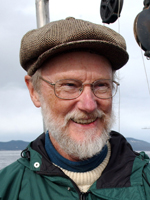
Colossal Wreck
“Round the decay
Of that colossal Wreck, boundless and bare
The lone and level sands stretch far away.”
Ozymandias
Percy Bysshe Shelley, 1818
by Robert Coats
Bob lives in the watershed of Blackberry Creek, a small urbanized but partially-restored tributary of San Francisco Bay. He may also be found occasionally in the Tahoe basin, where he is studying the impacts of climate change.

We thought our “Shining City on the Hill”
would last forever.
With our missiles and megatons
no foe could defeat us,
certainly not a tiny microbe.
What a pleasure it was
to hop on a plane to Paris,
hear the engines roar,
feel their thrust pressing us
back into our deep seats.
And every year,
a new shiny 4X4 with knobby tires
and such a nice smell inside.
Gas was cheap, and what a thrill
to rip across the empty desert.
Then: fields of withered corn,
towns consumed in firestorms
or washed away.
In the lobby of the Miami Marriott,
the marble floor decorated
with barnacles and plastic flotsam.
© Robert Coats

The Final Fairy
by Anna Cates
Anna resides in a small Midwestern town in a rural county, at the edge of the Appalachian mountains, on a quiet street near a field where pass the occasional deer. Her local watersheds include Little Miami River, Paint Creek, and Caesar Creek Lake.

Woods wane and buds break
in crimson spills over an empty field.
What eyes fail to see a wolf tracks,
yet gently. The final fairy, no bigger
than a buttercup, and just as sweet,
lingers, sometimes, only in our dreams,
hoping we’ll remember. Plant a tree
for her, and pick up your plastic waste.
Make haste! Make haste! she cries.
Remember! I, too, am dying!
© Anna Cates
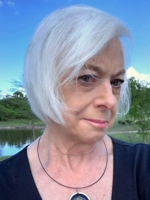
At Lake Martin
by Diane Elayne Dees
Diane, surrounded by hawks and egrets, lives three-quarters of a mile from the banks of the Tchefuncte River, not far from where it meets the Bogue Falaya, as they flow toward Lake Pontchartrain, where brown pelicans swoop the sky.

In April at Lake Martin,
snowy egrets nest in cypress
like fragments of clouds dropped
from Louisiana sky, an afterthought
of heaven. Egret mothers by the hundreds
gather thousands of strands of nesting fabric.
They glide white over water
to neighboring woods, then back,
their straw basket of vines and twigs
drooping from elegant heads.
Tufts of Spanish moss are swamp scarves
draped on tupelo: Nyssa aquatica,
the water nymph who shrouded the river
when Evangeline made her mournful trip
down the Atchafalaya, never again
to lay eyes on Acadie.
When the evening sky turns pink,
it is hard to tell the logs from the alligators.
All is not hushed; there is a mesmerizing rhythm
in the orchestra of owls, frogs and insects
who sweep the dream path clear for nestlings.
The night is sapphire, but for the golden orbs
of owls who watch the moon and listen to the pines
murmur their secrets. They wait for morning,
and the new pink sky. Soon there will be fresh pink
in the cypress limbs. Roseate spoonbills mass
the trees just down the path from the white forest
of egrets. Pink mothers perch high,
a dream of strawberry ice,
complete with spoons, waiting
to feed the rosiest-cheeked babies.
Mist covers Lake Martin,
blurring the white and pink,
floating through miles of ancient branches,
laying a soft veil over the swamp,
hiding it from the world.
Previously published in Spillway Review.
© Diane Elayne Dees

Call and Response
by Jessica Gregg
Jessica grew up and continues to live in the watershed of the Chesapeake Bay, in a corner of corn fields, foxes, and plenty of opportunities for stargazing.

In the blue-lid days of summertime,
ice melts with cracked glass fissure
and explosion, the collapsed calving
of frozen earth, sheering skin,
breaking bones. Spring leaks
into summer, glacial into cascade,
a tearing and renting of gray.
This is not a silent act nor
a peaceful transformation,
but clattering kettle drum rumbles
of awakening and resurrection,
captured on underwater microphones
meant to trap Soviet submarines.
Here, too, can be heard a percussion
of snorts and flute pitch whines,
the tuning fork of the blue whale
and its steady beat metronome.
This collective chorus of whale song
must out-shout, out-perform
the ice-letting and weeping
of season change. Calling to each other,
the whales moan louder and louder.
The earth shrugs off layers of winter,
layers of human waste until
the humpbacks synchronize.
They signal, their sameness silencing.
A sea-born anthem, a song of creation,
guttural gasps in deep-belly ocean.
Together, these whales make one song,
each for a mate, each note, each thread
the same, competing against the ice
crash of earth’s warming, a soundtrack.
The ecstasy of being alive, and uttered.
© Jessica Gregg